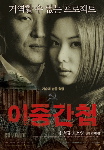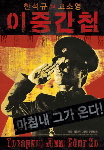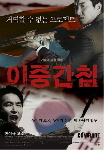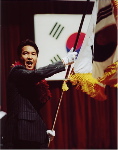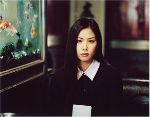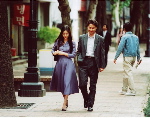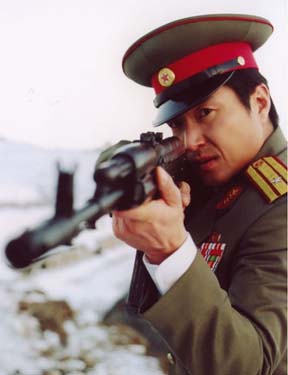| Comrade Aka "Double Agent" |
|
THE STORY
It’s 1980 at the height of the cold war Lim Byong-ho (Han Suk-kyu) is chased by North Korean officials at Checkpoint Charlie in East Berlin. He narrowly escapes. In safety on the other side of Checkpoint Charlie, Lim is met by South Korean Officials. Back in South Korea, Lim endures horrifying torture by the Korean Central Intelligence Agency (KCIA). Finally convinced Baek Seung-chul (Jun Ho-jin), the officer in charge, lets him work as a training officer for operatives on survival in North Korean territories. After two years Baek now head of operations brings Lim in to the heart of the agency as a special information analyst on North Korean matters. But the KRCIA never completely trusts him, as he is under constant following either to and from his apartment or at the job. But Lim is actually a North Korean spy. He takes his orders from a sleeper agent, Yun Su-mi (Go So-yung), who is the local radio station’s classical DJ. When her program is cancelled, they have to arrange other means of transmitting the orders from Pyungyang. So staging a fake chance meeting at the church where Baek and wife attends, the wife actually introduces them, they fake a budding romance, but due to their isolated lives as espionage agents, they actual develop true feelings for each other. When intel from Lim brings about the death of 16 South Korean spies, the net is tightened around the North Korean spies and fatal mistakes are made by Yun’s controller (Jae-ho Song). THE FILM “Double Agent” is very different from blockbusters like “Shiri” or “Joint Security Area”, which also deals with the relations between South and North Korea. Double Agent - due to débuting director Kim Hyun-jung’s choice, brings the troubled history of South Korea into fictional tale. In the movie Lim was interrogated at Namsan Mountain in Seoul. This was real life headquarters for KCIA in the 1970s and 80s. It was also a placed known for the brutal “interrogations” of mostly South Korean dissidents using a horrifying series of torture methods involving endlessly beatings, live electric wires and water. Also the film lets a romantic encounter take place at the Namsan Botanical Gardens, which is quite ironic given that “going to Namsan’’ back in that day was a euphemism for being interrogated. It’s one of the few South Korean films that touches upon the horror that KCIA inflicted on the citizen, mostly students. The film is also remarkable as Han Suk-gyu returns to the silver screen after a three year hiatus of his own making. The film itself is flawed as it never really knows if it wants to be a thriller like Donaldson’s “No Way Out” with a twist or Cold Spy thriller in the tradition of John Le Carre. Even the producers didn’t know how to sell the movie, so the marketing and the choice of casting Han in the lead made it appear to be “Shiri 2”, which it isn’t at all. But the movie has some strong points going for it: - The opening which looks like “Forest Gump” meets “The Hunt for Red October”: Han Suk-gyu is seamlessly put into old footage of military parade in Pyunyang, while the North Korean anthem plays. It has strong similarities to the Russian anthem. - The acting from both Han Suk-gyu and Jun Ho-jin. Their performances together sizzle, and Han still knows how to use subtleties to enhance his performance. Jun’s performance comes off like a Korean version of Tanaka head of Japanese Intelligence in “You Only Live Twice”, but only more dedicated and brutal in his dedication. The romance between Han’s and Yun Su-mi’s characters is not quite believable, compared to the rest of the film’s expert build up, but Yun does her best with what she is given. - The almost unforgiving portrayal of the extreme and inhumane methods used by the South Korean government in the fight against communism. The movie plays almost like a propaganda film from the McCarthy era when it comes to the portrayal of Lim, as he is literally the wolf in sheep’s clothing. Paraphrasing the original review in Korean Times: “It is the lack of resolution of different leads of ambiguity and incongruity that makes the film powerful - it is what is left unsaid that makes the story, all the more believable and resonant”. |
|
Henrik Korsbæk
July 10, 2004 |

